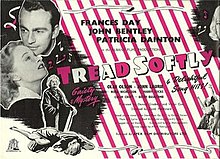
The door must remain locked. The seals must remain unbroken. When Madeleine Peters (Frances Day) the star of a new musical revue written by Keith Gilbert (John Bentley) walks out of the show in a plot hatched by her lover Philip Defoe (Olaf Olsen) he thinks the company will have to agree to being forced into keeping her as part of their contract despite her unsuitability. He doesn’t reckon on their finding another location – the Regency, a derelict theatre which has allegedly been haunted since their ‘Hamlet’ leading man died on the premises 40 years earlier. The eccentric widow Isobel Mayne (Nora Nicholson) of the dead actor is only persuaded to hire it out when her son Alexander (Michael Ward) agrees and the company accedes to her request that her late husband’s dressing room remain locked with nobody permitted to enter. With chorus girl Tangye Ward (Patricia Dainton) replacing Madeleine, rehearsals commence at the new home but then a body is found – it’s Alexander Mayne. Tangye is scared off and Gilbert comforts her but when Madeleine is found dead there too the police are called in and Inspector Hinton (Ronald Leigh-Hunt) discovers a link with missing emeralds from a jewel theft carried out years earlier with a suspect recently released from prison. As the secret is close to being exposed everyone’s life is in danger but the show must go on … Murder has been shut up there for forty years. Don’t let it out! The lovely actress Patricia Dainton might have expected a bigger career considering the showcase she has in her debut with five terrific song and dance routines in a very well plotted pacy backstage suspenser. Adapted by Gerald Verner from his novel The Show Must Go On with additional dialogue credits attributed to Donald Ginsberg & Vivian Cox, this was originally a radio serial before it was novelised. In a case of life imitating art, young usurper Dainton did indeed overtake Day in a sense, given that she was now definitely a film actress with a decade of good roles ahead of her, albeit in second features, while Day, a multi-talented star of previous decades, faded from view both as a film and theatre performer (she was a lead in Shaw’s final play Buoyant Billions, 1948) with this among her final screen roles. Her last would be for director Charles Crichton in 1957’s There’s Always a Thursday. Her costumes here were provided by Hardy Amies (who also dressed the Queen). Day’s storied private life with affairs throughout British society (male and female alike, from princes to heiresses) is the stuff of rumour and scandal. She was a panellist on the TV show What’s My Line? when feature offers dried up. This was Dainton’s first time to be paired with Bentley – in fact their next film together, and her second film, Paul Temple Returns, was released one month after this, in December 1952. Her ‘discovery’ on stage therefore coincides with her discovery in the film in a classic theatrical story (mimicking her own background as a dancer) and the romance and mystery produce several twists. John Laurie plays Angus McDonald, the theatrical agent with Olivia Winter his assistant played by Betty Baskcomb, the daughter of famed comic A.W. Baskcomb and who made her screen debut in Hitchcock’s The Man Who Knew Too Much. Aside from the crazy camp dancing by Colin Croft, staged by Alfred Rodriguez, perhaps the oddest thing of all in this production is the similarity between the title song (in a few different iterations here) and the 1980s pop hit, Move Closer. Watch out for legendary choreographer Kenneth MacMillan as a dancer in the troupe. Filmed at London’s Granville Theatre, Waltham Green, long since demolished, as well as Marylebone Studios, this is directed by the very accomplished former documentarian David MacDonald, who earned his movie stripes assisting Cecil B. DeMille and who made some terrific melodramas in the 1940s (The Brothers, The Bad Lord Byron) but was relegated to Bs and could have made much better use of the fascinating locations here. And just think what Stanley Donen could have done with those musical numbers by Ivor Slaney! Brush away the dust – you’ll find an older star